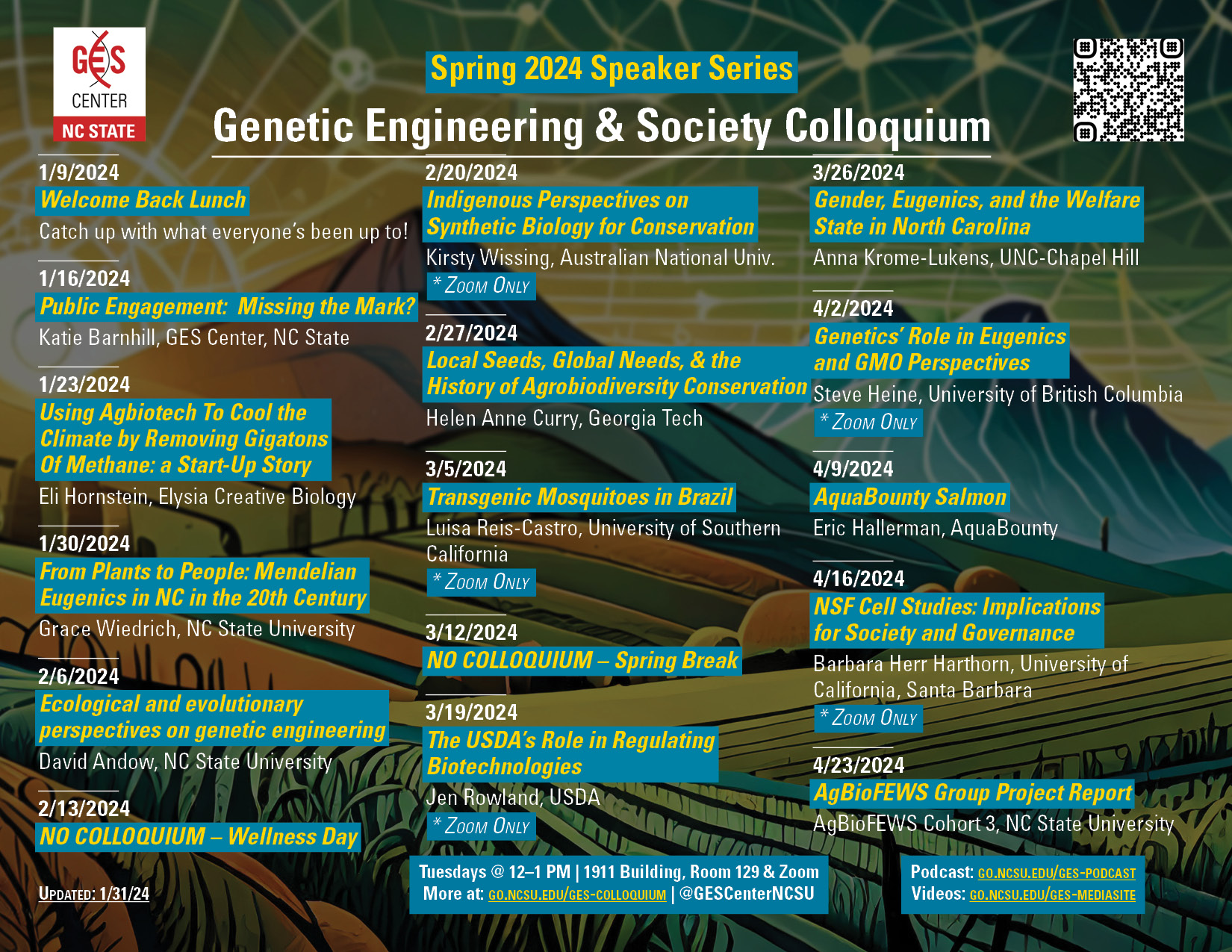
- This event has passed.
Grace Wiedrich – From Plants to People: Mendelian Eugenics in NC in the 20th Century | GES Colloquium

Colloquium Home | Zoom Registration | GES Video Library (current) | Video Archives | Podcast | @GESCenterNCSU | Newsletter
From Plants to People: Mendelian Eugenics in NC in the 20th Century 
Grace Wiedrich, CRDM PhD Student, NC State University
The Mendelian eugenics movement in NC provides a useful case study into the lasting impact of over-generalized genetic theory on governments, medical professionals, and activists.
Download seminar poster
Abstract
The history of eugenics in the United States is deeply entwined with theories about plants and animals arising in the 19th century. By the early 20th century, selective breeding of humans became a popular concern around the country. It was believed that all traits, from hair color to intelligence to morality, were passed on through the blood. However, even after geneticists had proven eugenics to be a pseudoscience by the 1930s, the popular culture of eugenics deeply impacted public policy, education, and activism into the 1970s. North Carolina provides a useful case study into the lasting impact of over-generalized genetic theory on governments, medical professionals, and activists.
Speaker Bio
Grace Wiedrich is currently a PhD student in Communication, Rhetoric, and Digital Media and an instructor in the English department at NC State. Her research focuses on eugenics rhetoric during the 20th century in the United States, with a special interest in the interplay among race, gender, and ability.
GES Colloquium is jointly taught by Drs. Jen Baltzegar and Dawn Rodriguez-Ward, who you may contact with any class-specific questions. Colloquium will be held in person in the 1911 Building, room 129, and live-streamed via Zoom.
Please subscribe to the GES newsletter and LinkedIn for updates.
WordPress database error: [Unknown column 'wp_tec_occurrences.start_date' in 'SELECT']SELECT SQL_CALC_FOUND_ROWS wp_posts.*, CAST( wp_tec_occurrences.start_date AS DATETIME ) AS event_date
FROM wp_posts LEFT JOIN wp_term_relationships ON (wp_posts.ID = wp_term_relationships.object_id) LEFT JOIN wp_postmeta ON ( wp_posts.ID = wp_postmeta.post_id AND wp_postmeta.meta_key = '_EventHideFromUpcoming' ) LEFT JOIN wp_postmeta AS mt1 ON ( wp_posts.ID = mt1.post_id )
WHERE 1=1 AND wp_posts.ID NOT IN (19490) AND (
wp_term_relationships.term_taxonomy_id IN (149,521,802)
OR
wp_term_relationships.term_taxonomy_id IN (45,47)
) AND (
wp_postmeta.post_id IS NULL
AND
( mt1.meta_key = '_EventStartDate' AND CAST(mt1.meta_value AS DATETIME) >= '2026-03-05 14:54:08' )
) AND wp_posts.post_type IN ('post', 'page', 'attachment', 'tribe_venue', 'tribe_events', 'tribe_event_series') AND ((wp_posts.post_status = 'publish'))
GROUP BY wp_tec_occurrences.occurrence_id
ORDER BY event_date ASC, wp_posts.post_date ASC
LIMIT 0, 3
